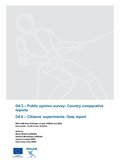
WP4 - Trust in and demand for quality journalism
Work Package 4 will analyse the supply-demand relationships of journalism in the era of post-truth politics and the ambivalence of the post-truth challenge to journalism and truth which might undermine trust but also create new demands for truth and thus opportunities for quality professional journalism.
We distinguish news/journalism media from social media platforms, where the latter function as amplifiers of the former and combine democratic public sphere theory with political normative theory to establish a framework for assessing which tools, actions and content are legitimate to use to counteract fake news/misinformation in democracies.
The main premise of the WP is that the spread and intensity of misinformation in the digital era is spearheading not only a decay of the democratic public sphere but also resistance and enforcement of democratic values.
The aim of the work package is to analyse the expectations and critical attitudes of citizens regarding quality journalism, truth and trust in media in the post-truth era. Furthermore the work package will map and critically evaluate demands for and supply of quality news and journalism standards in terms of impartiality and truth from the perspective of three key actors in the production and dissemination of news: a) digital platform/social media providers; b) professional journalists and news media organisations; c) governments.
Publications

Public opinion survey: Country comparative reports and Citizens’ experiments: Data report
Authors: Martin Moland (ARENA), Asimina Michailidou (ARENA), Jacopo Custodi (SNS) and Hans-Jörg Trenz (SNS)
This report begins by presenting country-level responses to questions regarding journalistic characteristics, functions, their perceived importance and fact-checking (D4.3). Subsequently, we present the results of our survey experiment (D4.6).


